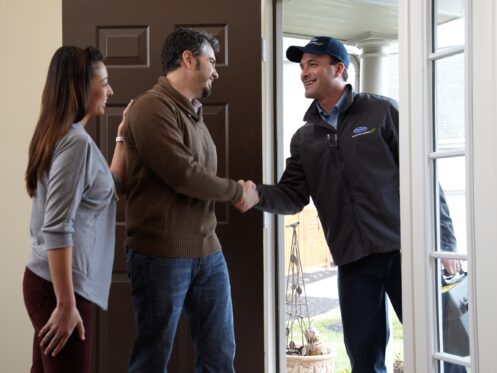Living in Colorado has its perks, including beautiful natural landscapes and plenty of leisure spots to enjoy year-round. However, it also means dealing with cold winter weather every year. To do that, your home will need a reliable and efficient heating system. Otherwise, you’ll either be too cold or spend a fortune to stay warm.
When the time comes for a new heating system, however, it can be challenging to choose the right one. Here’s what you need to know to select the most cost-effective heating option for your Colorado home.
The Contenders
When it comes to cost-effective heating, only two factors matter. One is energy efficiency. You want a system that uses as little energy as possible while still meeting your heating needs. The other is fuel cost. It’s ideal to choose a system that uses the cheapest fuel possible. If possible, you want a system that combines both of those qualities.
In the real world, however, there’s no perfect heating solution for every household. No matter what kind of system you select, there will be tradeoffs. That explains why two system types dominate the heating market here in Colorado. The most common option is a gas furnace. They’re very efficient and use the cheapest heating fuel there is: natural gas. For those reasons, an estimated 76% of Colorado homes rely on natural gas furnaces.
The second common system type is a heat pump. They boast energy efficiency that no other heating system type can come close to matching. However, they run exclusively on electricity. As a result of the higher relative cost of electricity, much of a heat pump’s efficiency advantage doesn’t translate to lower heating costs. In the right circumstances, however, a heat pump can save you significant sums.
The Case for a Gas Furnace
The argument for installing a furnace powered by gas is a strong one. For starters, they boast excellent energy efficiency. A minimally efficient gas furnace converts approximately 81% of the fuel it consumes to usable heat. Some more advanced models convert up to 98.5% of their fuel to heat. That efficiency, when combined with the low cost of natural gas, equals an inexpensive heating solution. While natural gas rates fluctuate, Colorado ranks approximately 11th in the nation for residential natural gas costs.
Additionally, natural gas furnaces output air that’s between 140 and 170 degrees Fahrenheit. That means they’re especially adept at driving the chill out of your home once activated. On the coldest nights, Colorado homeowners value that attribute. Additionally, the output temperature of a gas furnace isn’t dependent on the temperature outside. You’ll understand why that matters in a bit. Also, you should know that installing a gas furnace is relatively inexpensive. The only time that’s not the case is if your home lacks a preexisting connection to a natural gas supply.
The Case Against a Gas Furnace
The biggest argument against gas furnaces is that they help exacerbate climate change. After all, you’re burning fossil fuels right in your home to make heat. A gas furnace releases a potent mixture of nitrogen, carbon dioxide, and carbon monoxide into the atmosphere. Although natural gas burns cleaner than other fossil fuels, it’s disingenuous to claim it’s a green solution.
Additionally, there’s always a possibility that combustion gases may leak into your home if your furnace malfunctions. A malfunction can also carry the risk of starting a fire. Although gas furnaces have an excellent safety record, the risks are still worth considering.
The Case for a Heat Pump
Plenty of homeowners dismiss heat pumps the moment they learn that they’re electrically powered. That’s because conventional electric heaters are the most expensive heating solutions out there. However, heat pumps aren’t like traditional electric heaters at all. Rather than using electric resistance to make heat, they instead gather heat energy from the outside air.
The simplest way to understand the process is to think of your AC running in reverse. By avoiding the need to produce heat, heat pumps can operate at up to 400% efficiency. However, that efficiency wanes as it gets progressively colder outside. So does their heat output. In extreme cold, a heat pump may engage an electric heating element to provide sufficient heat.
Heat pumps can also function as a cooling system. That means installing one takes care of your home’s comfort needs year-round. And it’s worth pointing out that heat pumps routinely rank among the most efficient cooling solutions, too. They also carry no risk of releasing toxic gases into your home.
The Case Against a Heat Pump
The primary case against selecting a heat pump is that electricity is quite expensive. That means running a heat pump, despite its unbelievable efficiency, can be more costly than a furnace. Also, as previously mentioned, heat pumps lose efficiency as the temperature drops.
At about 20 degrees Fahrenheit, a standard heat pump is equal in efficiency to a standard furnace. That means the heat pump will be more expensive to operate at that point. However, you can opt for a cold-climate heat pump that will remain about 175% efficient at temperatures as low as 5 degrees. Doing so will increase your upfront costs, however.
Speaking of costs, you can expect a heat pump to cost approximately twice as much as a gas furnace. However, a heat pump serves as a heating and cooling solution. In that light, the price makes far more sense. Still, though, a high upfront price tag can be a significant obstacle, even if you’d get your money’s worth in the end.
Getting the Most Out of Your Options
If you’re looking for a reliable way to heat your home without breaking the bank, it’s hard to beat a gas furnace. However, that assumes you already have a natural gas supply for your home. Otherwise, a heat pump is the better overall choice. In that case, you’d get efficient heating and cooling for roughly the cost of a furnace and gas line installation. It’s worth pointing out, however, that there are some ways to maximize either investment.
If you have the budget, you can install a rooftop solar power system to go with a new heat pump. The combination can yield the most cost-effective heating solution, because much of your power consumption becomes free. If that’s not an option, though, you can instead take a best-of-both-worlds approach. To do it, you can select a hybrid heat pump.
A hybrid heat pump combines a small gas furnace with a heat pump. The system operates in heat pump mode down to a predetermined outdoor temperature. Then, it switches to the furnace when it’s advantageous to do so. It’s a system that ensures you’re using the most efficient and cheapest heating option at all times.
Your Local Efficient Heating Experts
Ultimately, either heating option detailed here will provide cost-effective heating. Combining the two is even better. However, no matter what option you choose, you should count on Fox Heating, Cooling & Plumbing to install it. We sell and install quality furnaces from today’s leading manufacturers.
Our decades of experience mean you can trust us to get your installation done right the first time. But you don’t have to take our word for it. Instead, read some of our customer testimonials to find out more about the quality of our heating services.
When you’re ready for a new, efficient heating system in your Denver, CO home, call Fox Heating, Cooling & Plumbing!

